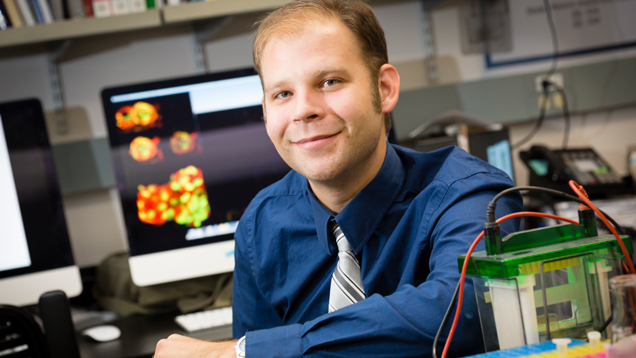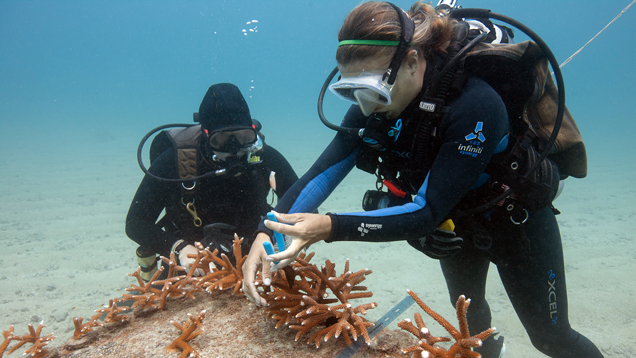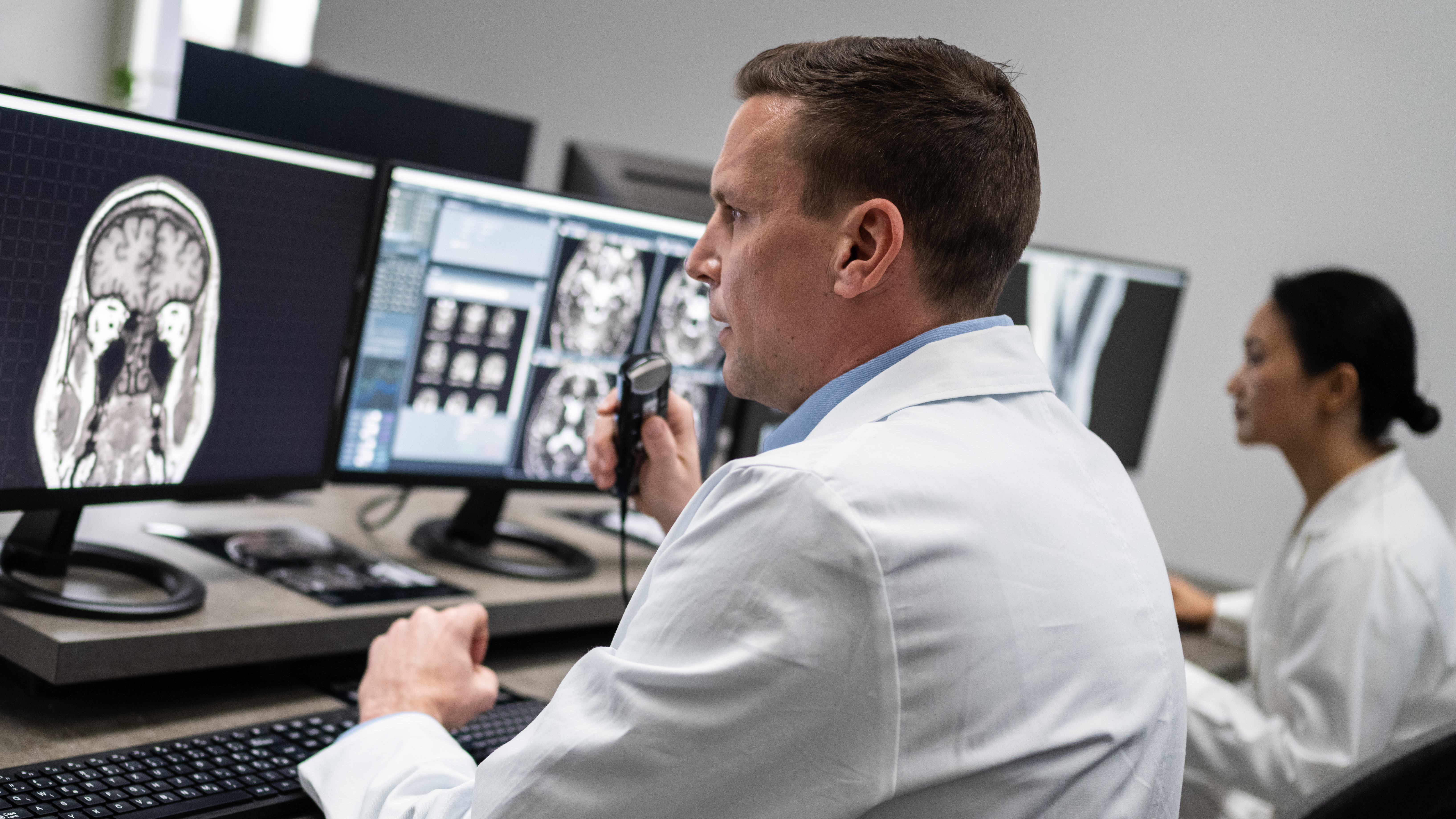Pushing the Boundaries of Human Knowledge
At this pivotal moment in NSU Research's pursuit of innovation, we are excited to showcase the extraordinary work of our faculty, students, and staff propelling Nova Southeastern University to the forefront of research excellence. They are making meaningful strides in improving patient care, discovering new treatments, reducing mental health disorders, and exploring the forces impacting our oceans. With a commitment to innovation and excellence, NSU leads across health care, biotechnology, life sciences, environment, and social sciences. Each new discovery expands our impact on society.
Together, we aim to address pressing societal challenges, fostering a healthier, more sustainable, and equitable future. We invite you to join us in this journey to create a positive impact on our world.
Health Care Innovation

Every Discovery is a Step Toward Improving the Human Condition
NSU Research innovation encompasses a spectrum of scientific breakthroughs, cutting-edge medical technologies, precision medicine, personalized health care, health care policy and system reform, biomedical engineering, bioinformatics, and interdisciplinary collaboration. Combined, our efforts advance human health, well-being, and longevity.
 Education
Education
10 colleges boast health-related focuses: Allopathic Medicine, Business, Dental Medicine,
Health Care Sciences, Law, Nursing, Optometry, Osteopathic Medicine, Pharmacy, and
Psychology.
 Research
Key areas include cancer/anti-cancer therapies, dental/oral cancer, cancer biology,
regenerative medicine, marine-informed genetics, and marine-based therapies.
Research
Key areas include cancer/anti-cancer therapies, dental/oral cancer, cancer biology,
regenerative medicine, marine-informed genetics, and marine-based therapies.
 Community Engagement
NSU Health operates 70+ medical, dental, and psychological clinics serving a large portion of low income and uninsured patients
with services to qualifying veterans and their family members provided for little
or no cost.
Community Engagement
NSU Health operates 70+ medical, dental, and psychological clinics serving a large portion of low income and uninsured patients
with services to qualifying veterans and their family members provided for little
or no cost.
10 colleges boast health-related focuses: Allopathic Medicine, Business, Dental Medicine, Health Care Sciences, Law, Nursing, Optometry, Osteopathic Medicine, Pharmacy, and Psychology.
Known as forever chemicals because they never fully break down in the environment, PFAS (per- and polyfluoroalkyl substances) are found in oceans, groundwater, drinking water, and food. Could these toxins be causing enamel to thin? Maiko Suzuki, D.D.S., Ph.D., an associate professor at the NSU College of Dental Medicine, is investigating the molecular mechanisms of how PFAS affect the formation of teeth.
Amblyopia, also known as lazy eye, occurs when the eye and brain don’t properly work together. Roger W. Li, O.D., Ph.D., an associate professor at the NSU College of Optometry, is testing whether immersive video games could help children restore stereo vision, the ability to perceive depth and three-dimensional structures by processing visual information from both eyes.
When bacteria resist antibiotics, infections worsen. Robert Smith, Ph.D., associate professor at the NSU Cell Therapy Institute and the NSU Dr. Kiran C. Patel College of Allopathic Medicine, has discovered how these organisms communicate with each other in a wound. If this communication can be interrupted, solutions may be found to heal infections.
Ecosystems and Communities

Saving Our Seas
Climate change, overfishing, and habitat destruction cause the loss of marine life, which in turn harms our oceans. NSU researchers at the Halmos College of Arts and Sciences and the Guy Harvey Oceanographic Research Center work with partners to restore coral reef ecosystems, conserve sea turtles, and protect sharks and other marine life.
Coral reefs, threatened by climate change and emerging chemicals of concern, are being revitalized thanks to NSU researchers. Abigail Renegar, Ph.D., a research scientist in the NSU Halmos College of Arts and Sciences, and colleagues grow corals on and off shore in nurseries that are then transplanted to coral reefs.
For more than 100 million years, sea turtles have maintained the health of the world’s oceans. These sea creatures control prey such as jellyfish, eat sponges that compete for space in reefs, and deposit nutrients that nourish dune vegetation. Derek Burkholder, Ph.D. from the NSU Halmos College of Arts and Sciences, directs the sea turtle conservation program with colleagues and partners, including the Broward County Sea Turtle Conservation Program. The team searches for nesting behavior along Broward’s 24 miles of beach, tracks eggs, protects nests, and educates the public.
Sharks get a bad rap. A misunderstood species because of TV shows and movies, these top-of-the-food-chain predators are critical to balancing our fragile marine ecosystem. To conserve sharks for generations to come, Mahmood Shivji, Ph.D., a research scientist and professor at the NSU Halmos College of Arts and Sciences and the NSU Guy Harvey Oceanographic Research Center is tagging and tracking shark movements, collecting DNA fin data, and studying migration, reproduction, and habitat requirements.

Communities
Tackling Some of the Toughest Problems in Society
Stress, suicide, and depression are not easy to talk about. NSU researchers take the stigma out of mental health by collaborating with communities to research issues and develop programs to help ease the pain.
Foster youth aging out of the foster care system struggle with finding jobs and establishing a life on their own. Galaxina Wright, Ph.D., assistant professor in the NSU College of Psychology, helps by developing job search workshops in partnership with the FLITE (Fort Lauderdale Independence, Training & Education) Center. The training helps young people search for jobs, plan for careers, and network. The team also provides support for coping with stress and managing anxiety, a common and serious mental health concern among foster care youth.
With a more in-depth understanding of mental health issues, educators everywhere can help reduce stigma and foster necessary support. Christi M. Navarro, Ph.D., assistant professor at the NSU Dr. Kiran C. Patel College of Osteopathic Medicine, in partnership with the United Way of Broward County, aims to increase mental health literacy among NSU faculty, staff, and students. Her team will conduct training called Mental Health First Aid and assess the effectiveness of the program.
To combat increased rates of suicide, Scott Poland, Ed.D., a professor in the NSU College of Psychology and director of the Suicide and Violence Prevention Office, received a grant from the Florida Blue Foundation to develop a toolkit for school educators, often the first line of defense in recognizing suicide crises in students.
Parents of infants treated in the neonatal intensive care unit at hospitals frequently suffer from higher rates of depression and anxiety than the general population. Raquel Garcia, SLP.D., CCC-SLP, CLC, CNT, NTMTC, BCS-S, assistant professor in NSU’s Dr. Pallavi Patel College of Health Care Sciences, has been awarded a grant to improve parent-child attachment and reduce parental stress. Garcia and colleagues are collaborating with the HCA University Hospital Neonatal Intensive Care Unit and several colleges in the NSU Health Professions Division.
Brain and Development

Improving the Lives of People Affected by Neurological Disorders
Neuroscience and neurodevelopment spans an interdisciplinary range that integrates neuroscience, psychology, education, and public health. We aim to understand and contribute to the knowledge and applications for the complex interplay between brain biology, environmental influences, and developmental outcomes across the lifespan.
Researchers are exploring the role of mind wandering, especially negative thoughts, on inflammation during chronic periods of stress. Jonathan Banks, Ph.D., associate professor, and collaborator; Jaime Tartar, Ph.D., professor and department chair in the NSU College of Psychology, have been awarded a National Science Foundation grant to identify the role of mind wandering in stress, inflammation, and cognitive function. The team has collected baseline data from medical and law students who experience a great deal of stress from challenging curricula and exams. Results from this work may lead to targeted behavioral interventions to reduce stress and associated inflammation.
A lack of effective treatments for various neurological disorders such as addiction, mood disorders, and dementia fuels the research of Lisa S. Robison, Ph.D., assistant professor of neuroscience in the Department of Psychology and Neuroscience. Robison and colleagues are studying whether lifestyle factors such as diet are influencing these disorders and, if so, what changes can be made to prevent, delay, or treat these neurological ailments.
Two-thirds of Alzheimer’s patients are women, and greater longevity alone does not explain why. Benedict C. Albensi, Ph.D., from NSU’s Barry and Judy Silverman College of Pharmacy, and Co-PI Lisa S. Robison, Ph.D., from NSU’s College of Psychology, have received a National Institutes of Health grant to dig into reasons for the disparity. The team is exploring whether a high-fat diet, obesity, and diabetes worsen the pathology seen in Alzheimer’s disease.
While many students diagnosed with Autism Spectrum Disorder display academic and creative talents, others can find life challenging when it comes to navigating social environments and applying problem-solving skills. Melissa M. Tovin, PT, Ph.D., CEEAA, PCS, professor at the NSU Dr. Pallavi Patel College of Health Care Sciences, is providing virtual exercise programs, coaching, and wellness kits geared to the unique needs of adolescents to young adults. Tim Scala, Psy.D., associate professor and Maribel Del Rio-Roberts, Psy.D., associate professor at the NSU Abraham S. Fischler College of Education and School of Criminal Justice, are training NSU staff and faculty on strategies that support students in a higher education setting. All projects were funded by the Robert E. Dooley Trust NSU Center for Autism Endowment Fund.
Clinical Research
Led by Eduardo Locatelli, M.D., M.P.H., the new David and Cathy Husman Neuroscience Institute at NSU Health was established to study and treat patients of Amyotrophic Lateral Sclerosis (ALS), known as Lou Gehrig’s Disease. Through the clinic, patients and their caregivers receive expert care for ALS as well as Alzheimer’s disease and Parkinson’s disease. Patients can participate in clinical research involving drug trials and other efforts. Researchers are working to find a cure for these debilitating conditions. The institute was made possible by a $10 million pledge from David Husman, in memory of his wife Cathy.
A major condition affecting Gulf War veterans is a cluster of medically unexplained chronic symptoms, including fatigue, headaches, joint pain, and indigestion. Nancy Klimas, M.D., assistant dean at the NSU Dr. Kiran C. Patel College of Osteopathic Medicine and director of the Institute for Neuro-Immune Medicine, and Amanpreet Cheema, Ph.D., assistant professor in the Dr. Kiran C. Patel College of Osteopathic Medicine have received funding to collaborate on a national study investigating a low glutamate diet as treatment for “Gulf War Illness.” Glutamate is released in veterans post war because of neurotoxin exposure. Cheema explores carefully selected bioactive agents and dietary interventions to correct the biology involved.
Data Science and Cybersecurity
As cyberthreats grow and transform at a rapid pace, organizations race to prevent attacks. Yair Levy, Ph.D., professor of information systems and cybersecurity, researches how human factors, such as employees innocently clicking on email scams, can be prevented. He is developing advanced tools to measure cybersecurity skills, human errors, and insider threats. His research will help organizations with email compromise, social engineering and phishing, cyberthreat mitigation, and cybersecurity risk management.
NSU’s College of Computing, AI, and Cybersecurity has been designated a National Center of Academic Excellence in Cyber Research for its doctoral programs through academic year 2028. The program’s criteria validate that NSU will contribute to the protection of the national information infrastructure and address the critical shortage of professionals with cybersecurity skills.
Leadership and Advocacy
Bahaudin Mujtaba, D.B.A., professor in the H. Wayne Huizenga College of Business and Entrepreneurship, won a Provost’s Research and Scholarship Award in 2023. With an extensive publication record and thousands of citations covering topics such as business, change, culture, ethics, and diversity, he has collaborated with more than 50 coauthors. During the past 30 years, he has worked with managers and human resource professionals in nearly 20 countries. This diverse exposure has provided him with insights in cross-cultural management from the perspectives of various firms, groups, and cultures.
A native of Rhodesia (now Zimbabwe) Ismael Muvingi, Ph.D., professor in the NSU Halmos College of Arts and Sciences, studies human rights, African politics, and transitional justice with a special focus on Africa. A lawyer and academic, he has published a book, “Oil, Diamonds and Human Rights in the Marketplace,” as well as scholarly articles on Zimbabwean politics and on transitional justice. His dissertation was a comparative study of the Conflict Diamonds Campaign and the Capital Market Sanctions Campaign (on Sudan) in the U.S.

